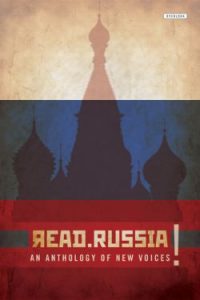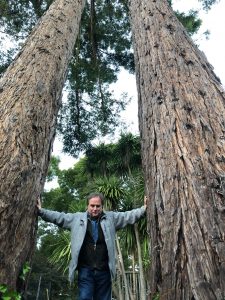 This week RusTrans spoke to Peter B. Kaufman, President and Executive Director of Read Russia, an organization which promotes and fosters Russian book culture through initiatives such as the biannual Read Russia Prize for new translations of Russian literature, the Chatham Translation Symposium, and regular publications. It also supports the wonderful Russian Library series from University of Columbia Press, which we’ll feature soon on this blog. Peter Kaufman works at MIT Open Learning and the MIT Knowledge Futures Group and is the author of The New Enlightenment: The Fight to Free Culture In A World Online, forthcoming from Seven Stories Press (2021). He established Read Russia in 2011. In 2014, RBTH called him ‘the world’s leading advocate of Russian literature‘.
This week RusTrans spoke to Peter B. Kaufman, President and Executive Director of Read Russia, an organization which promotes and fosters Russian book culture through initiatives such as the biannual Read Russia Prize for new translations of Russian literature, the Chatham Translation Symposium, and regular publications. It also supports the wonderful Russian Library series from University of Columbia Press, which we’ll feature soon on this blog. Peter Kaufman works at MIT Open Learning and the MIT Knowledge Futures Group and is the author of The New Enlightenment: The Fight to Free Culture In A World Online, forthcoming from Seven Stories Press (2021). He established Read Russia in 2011. In 2014, RBTH called him ‘the world’s leading advocate of Russian literature‘.
Quarantine, and fear for ourselves and our loved ones, have radically re-shaped how we think and behave. How have you adapted to your new working conditions? How has the crisis affected your future plans and/or your creative process?
I have long been acclimated to the art and rhythms of working from home – as a non-profit administrator, as a consultant, as a writer, a teacher, a producer. More accurately, at times, it’s living in one’s office. I’ve known what it’s like to choose whether to wear dress clothes or not; how to schedule meals; negotiate family needs; file bills; go outside. But the crisis – first of Trump, then of the pandemic – has sharpened my sense of the stakes involved in that home work now, for me, for my cohorts in various places, and for society at large: it has rendered me more restless, impatient, sometimes even desperate to act, creatively, socially, politically, such that time is not lost. In a bathrobe or in corduroys, I am writing like a fiend.
 What do you think will be the knock-on effect from lockdown on translation publishing? Are there advantages as well as disadvantages for people in the creative industry?
What do you think will be the knock-on effect from lockdown on translation publishing? Are there advantages as well as disadvantages for people in the creative industry?
It’s hard to make predictions about translation publishing – as the time cycles involved are so lengthy to begin with, involving years, usually, and the pandemic has only been with us for a few months. But I might try out here a thought I have been having about the English-speaking world coming face-to-face with government lies that almost outpace the lies emanating from the systems of authoritarian regimes that governed post-Revolutionary Russia and post-war Central and Eastern Europe, which are the sources of the literatures outside our own I know best. That thought is this. Do you know how love songs can play on the radio when you are happy and you barely hear them, but when you are heartbroken they are so meaningful you sometimes have to stop listening? Some of the Russian and especially Soviet and post-Soviet works we know – and many of the Polish, Czech, Hungarian, and other Mitteleuropa classics – possess a deeper dimension of meaning precisely because they emanate from societies full of untruths and deprivations, and it might be that these texts will resonate more now with American and British readers who are, as the original readers of these foreign literatures had been, standing in lines, lied to, masked in various ways, always vulnerable and unvaccinated. Songs about life under a ruptured or absurd social contract may become more resonant to English readers now. Plus, photos of our ridiculous and shattered lives here could be used as cover art for translations of some of the classic works we love.

Chatham Translation Symposium, Cape Cod, 2019
What has been the impact on your work of cancelled book fairs, book launches, speaker events and so on? Is there a danger that the English-speaking world will forget Russian culture?
If I start forgetting things, Russian literature, music, theatre, painting, and dance will be the last to go. What we who care most about Russian culture in the West need to do is develop strategies and methods for promoting it online – in video and sound – and in ways that make it break through as every other culture, and segment of those cultures, makes itself manifest on the rectangle in front of us, and each bit is a competitor for virtual space and attention.
With your links to the publishing world, are you aware of increased sales thanks to locked-down populations turning to books for relief? Could this be a golden moment for reading?
It’s a golden moment for something – receptivity, maybe. We have been skinned, in a way, made raw; everything affects us now. I believe that plunging into fiction is a great escape; but the lessons and learnings in good writing also make us healthier. Maybe the new saying should be, That which doesn’t try to kill us makes us stronger.
And finally which book(s) do you think stand a good chance of winning prizes for translated fiction – such as the Read Russia Prize (2020)?
Guzel Yakhina’s Zuleikha, in Lisa Hayden’s translation, knocked me out.
Thank you for speaking with us, Peter. Next week we’ll speak with acclaimed translator Marian Schwartz about the ongoing crisis.